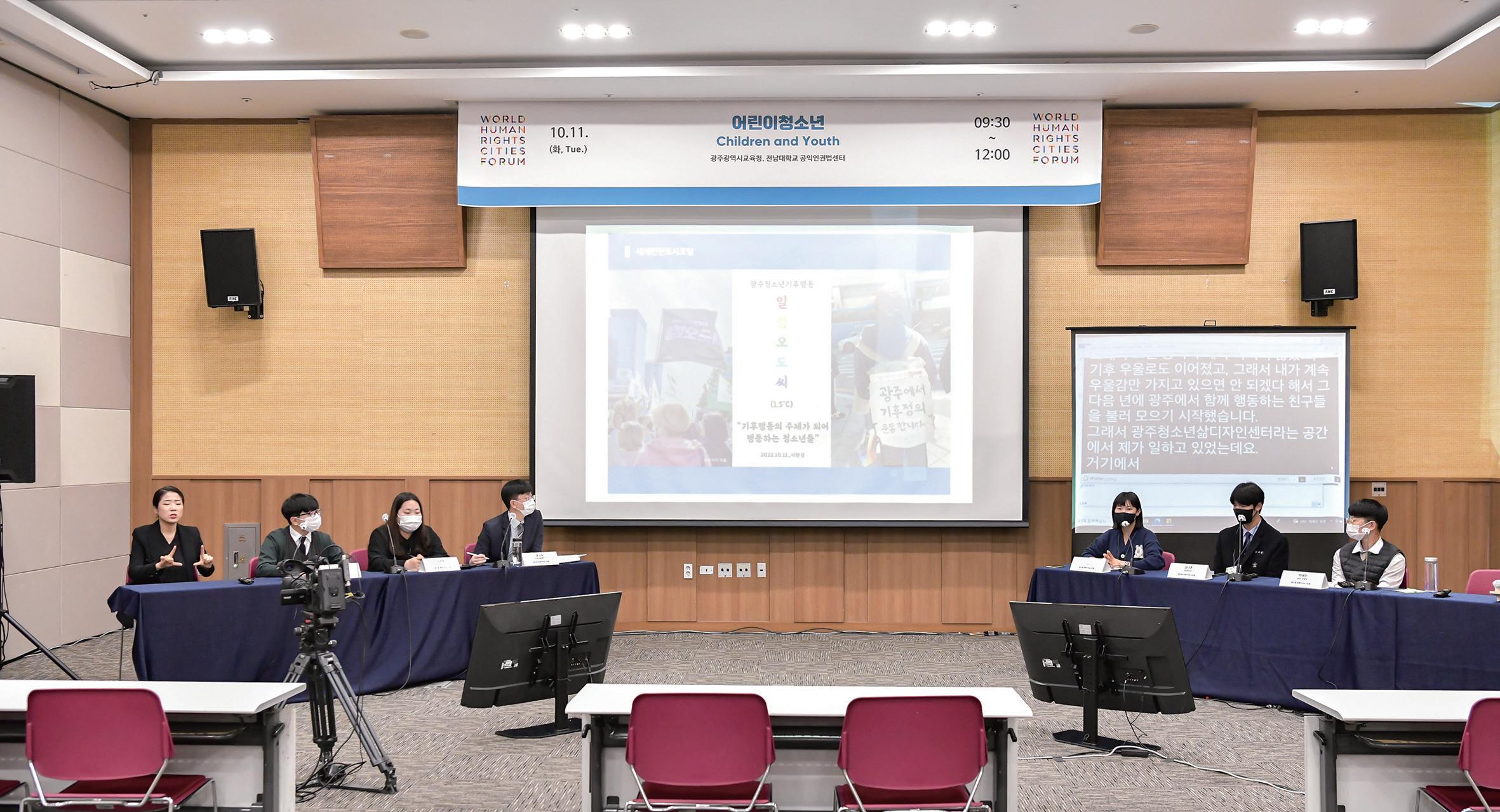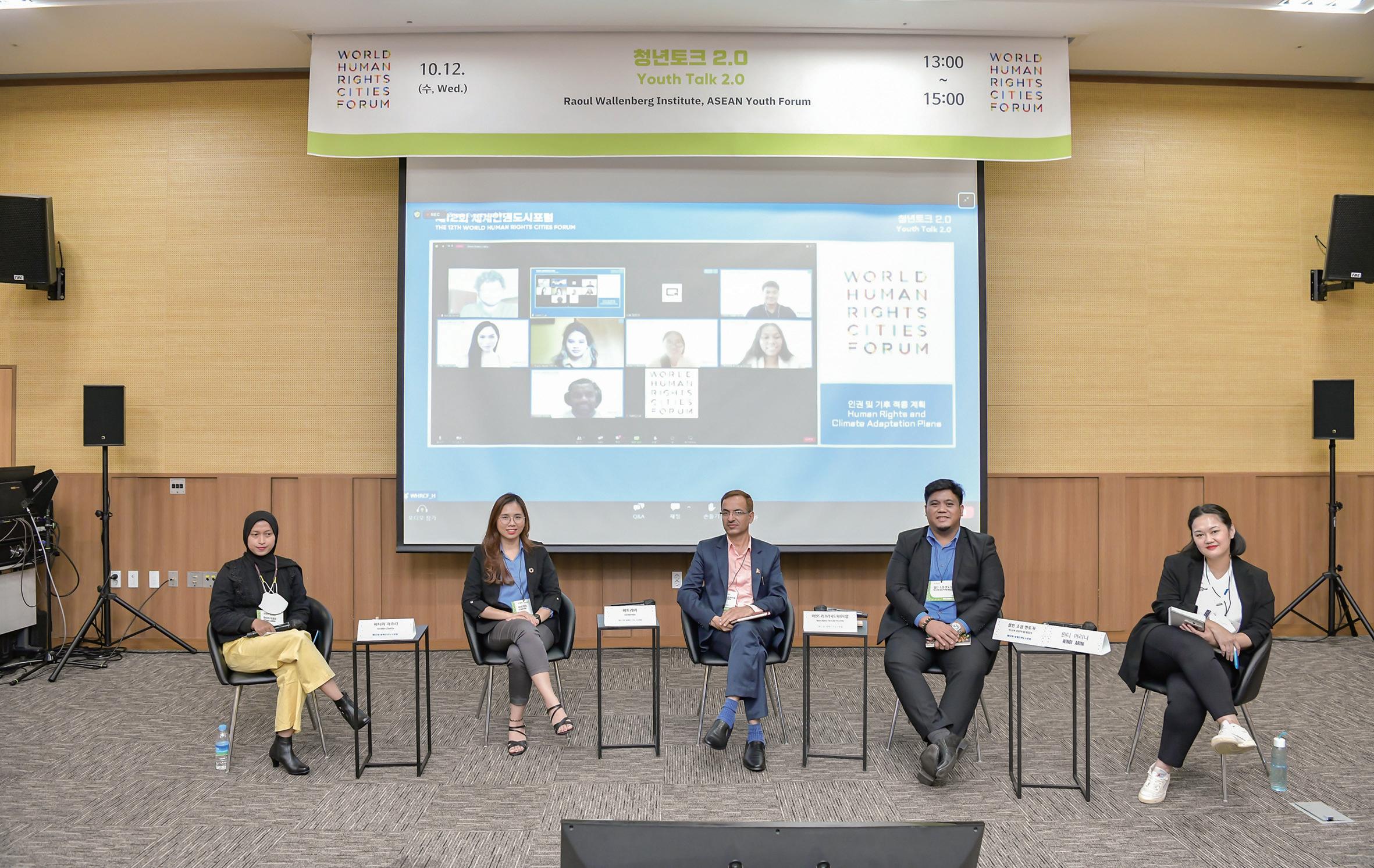
9 minute read
The 12th World Human Right Cities Forum: Views from Participants
Compiled by the WHRCF Secretariat
The 12th World Human Rights Cities Forum (WHRCF) was held at the Kimdaejung Convention Center for four days, October 10–13, 2022. During this year’s Forum, 38 programs were organized with 320 domestic and foreign speakers and around 1,900 participants in total. Under this year’s theme, “Climate Crisis and Human Rights,” we concluded that it was important to recognize that the climate crisis could also impact human rights, not just the environment. Also, we came to understand that the first groups to be put into jeopardy are the vulnerable. In addition, we took time to explore ways to secure human rights of those in need. Furthermore, we had in-depth discussions on the important role of local governments that have been able to develop prompt and direct responses to human rights issues in this global emergency.
Advertisement
This year’s Forum, attended by officials and those related to international organizations and local governments at home and abroad, dealt with globally discussed issues and shared best practices. The Forum invited young activists and provided attendees with an opportunity to listen to their voices and understand their views as well. In particular, the Forum, held in-person this year, was able to provide a very active atmosphere that we have not seen over the past two Covid-effected years. At every corner of the venue, we could see that domestic and international participants freely shared their opinions and thoughts with one another. Tour programs (including a Human Rights Tour, Human Rights Policy Tour, and Culture and Arts Tour) and other side events provided participants with diverse experiences and a fun time.
The secretariat of the WHRCF has asked officials and speakers from domestic, international, and overseas organizations to send their reviews in order to report on the vivid atmosphere of the Forum. Based on their views, the secretariat has prepared a follow-up report on the 12th WHRCF from the viewpoints of participants. The following comments are from representative officials and speakers who were part of the Forum and concern what they saw and felt.
NATIONAL PARTNER OFFICIALS
Bae Hyun
Department Head of the Gwangju Human Right Center for People with Disabilities
My name is Bae Hyun, and I was in charge of the disability-focused session co-organized by the Gwangju Human Rights Center for People with Disabilities and the ▲ Bae Hyun Gwangju Solidarity on Eradicating Discrimination Against Persons with Disabilities at the WHRCF every year. As this year’s
▲ Main speakers at the World Human Rights Cities Forum during Plenary Session 1.
Forum was held under the theme of “Climate Crisis and Human Rights,” we organized the session’s agenda by posing a question: What Is the Future of the Rights of Persons with Disabilities in the Era of the Climate Crisis? Extreme heat waves, floods, pandemics, and other climate and ecological crises caused by climate change are worsening every year. As such, discrimination and inequality against minorities, including persons with disabilities, have been worsening around the world, so the theme was timely and appropriate.
I remember the words of one presenter, Michal Balcerzak, the committee vice chairperson of the UN Committee on the Elimination of Racial Discrimination. He said, “In responding to the climate crisis, it is very important how we interpret and apply the term ‘vulnerability.’ There is some controversy around the term. It has been used in international laws and soft laws related to the climate crisis and disasters, so we need to ponder how to interpret and apply the term.” I also believe that this issue requires discussions among all relevant parties because the contents and quality of responses are dependent on the interpretation of “vulnerability” when it comes to human rights security for persons with disabilities in the climate crisis era. Lastly, I have benefited a lot while preparing for the sessions on disabilities over the past several years. I have been able to have a chance to meet and work with relevant people from various organizations and groups in the process, which widened my perspective, as I encountered the issues that other people face. As a result, I came to be interested in various human rights issues, not only in disabilityrelated issues in our society. In this regard, I think that the WHRCF is significant for the broad range of issues it addresses. In particular, one of the strengths of the WHRCF is that the it and its organizers try to make sure the results from the thematic sessions are linked to actual policies and systems.
YOUTH ACTIVISTS
Park Hyun-bin
Student at Gwangju Inseong High School
Hello, I am Park Hyun-bin, a resident of Gwangju, South Korea, and a student at Gwangju Inseong High School. As a youth activist, it was my second time to be part of the WHRCF. Now, I would like to share my review on attending the Forum. My first time at the WHRCF, I attended the thematic session related to children and youth. At that time, I
delivered a speech on studentengaged ecological education with the agenda of “Seeking Educational Transition in the Disaster Era.” During my remarks, I concentrated on the necessity for changes in the educational system and curricula, and the severity of the climate crisis from the perspective of youth. I remember that when an official from the secretariat asked me whether I was available for the Forum, the term “world” in the title felt quite overwhelming to me. Also, I was the only student participant, which made me more nervous. When I was at the venue, however, I was able to feel a very warm and welcoming atmosphere. I was worried that the audience and organizers might ignore my opinions and words because I was a student; however, they paid attention to me, which made me feel respected. In my view, the most noticeable characteristic that distinguishes the WHRCF from other such events is that the youth and students are given an opportunity to speak. During this year’s Forum, I attended thematic sessions on children and youth that I had participated
in previously and talked about climate actions. Also, I had time to discuss the youth’s thoughts on ways to respond to the climate crisis and exchanged opinions with others. What made me surprised was that, thanks to Covid-19’s gradual reduction, many international attendants participated in the session to listen to the opinions of the youth. In addition, I could see more young participants this year than ▲ Park Hyun-bin last year. Kim Na-hun, a youth activist at the event, expressed that some students agreed on the severity of the climate crisis; however, that was not enough to directly lead to action, with which I fully agree. Therefore, my plan is to take aggressive action to figure out ways to make the youth have full empathy in regard to the climate crisis and enable them to easily take direct actions against said crisis. I hope to see that the results from the discussions at the Forum are turned into action and do not just remain words.
Lee Han-gyeol
Representative of the Gwangju Youth Climate Action 1.5°C I am Lee Han-gyeol of “1.5°C,” a Gwangju youth climate activist group. As a representative activist, I participated in the WHRCF’s “Youth Action in


▲ Children and Youth session attended by Park Hyun-bin (second from left) and Lee Han-gyeol (third from right).
Response to the Climate Crisis” session. During the session, we discussed cases of youth climate action in Gwangju, climate justice, and human rights of the youth. While attending the WHRCF, I expected that the voices of the youth climate activists would reach out to ▲ Lee Han-gyeol a greater number of people. We had a chance to talk about the rights of youth activists, including topics like the “climate crisis of the youth,” the “right to know about what is going on around the world,” the “right to study climate justice,” the “right to eat a vegan lunch,” and the “right to go picketing every Friday.” We hoped that our voices and opinions would be well accepted in society. Through this latest WHRCF, I think that I gained good companions. I was able to meet four other panelists who participated in the session, and we have kept a good relationship with one another since. Recently, we have even been working on some climate justice actions in Gwangju based on solidarity. We have determined to come up with interesting climate actions for the city. So, please, keep your eye on us.
INTERNATIONAL PARTNER OFFICIALS
Wulandari Anindya Kana
Communications Officer at the Kota Kita Foundation
Organizing and participating in the 2022 WHRCF has been such an eye-opening experience for me! For three days, we had the chance to connect and learn with a diverse network of likeminded activists, civil society ▲ Wulandari Anindya Kana organizations, experts, and government officials working hard to advance rights-based action plans toward a sustainable future. Besides the talks and discussions, my colleagues and I also got to learn more from the city of Gwangju and its citizens on how to engage various stakeholders in the city to promote human rights and democracy during the Human Rights Tour and Human Rights Policy Tour. Concurrently, the lessons we learned from the tours serve as an example and a reflection on the session that we organized, which highlighted the topic of the Right to the City and showcased citizen-led collective action that aims to promote and achieve climate justice.
Even though this was personally my first time to come to Gwangju to attend and organize a session at the WHRCF, Kota Kita Foundation’s WHRCF attendance and cooperation with the Gwangju International Center date way back. As we have done in prior years, the Global Platform for the Right to the City and the Kota Kita Foundation are keen to continue our participation in the 2023 WHRCF to build on this year’s session and to encourage more profound discussions. See you at the 2023 WHRCF!
OVERSEAS PARTICIPANT
Fithriyyah Iskandar
Youth Right Ambassador for Clean, Healthy, and Sustainable Environment, ASEAN Youth Forum
I was one of the panelists for the special session [Youth Talk 2.0] – Human Rights and Climate Adaptation Plans organized by the Raoul Wallenberg Institute of Human Rights and Humanitarian Law and the ASEAN Youth Forum. Attending the WHRCF was a really impressive experience, as I never expected to be so impressed by Gwangju’s history and its commitments to creating an environmentally friendly city. Besides that, by experiencing the Forum activities in person and ▲ Fithriyyah Iskandar meeting so many experts from various countries and regions, I also realized that the WHRCF successfully brought together the important stakeholders, governments, and youth to be at the same table to address the ways in which human rights are related to environmental issues. I learned a lot about best practices, which were provided by resource persons, about country and city adaptation plans in response to the climate crisis. I think this is something that we need to have to provoke further discussions based on best practices so that there will be meaningful knowledge- and experience-sharing that can inspire policy prototypes or adaptation models in each country.











